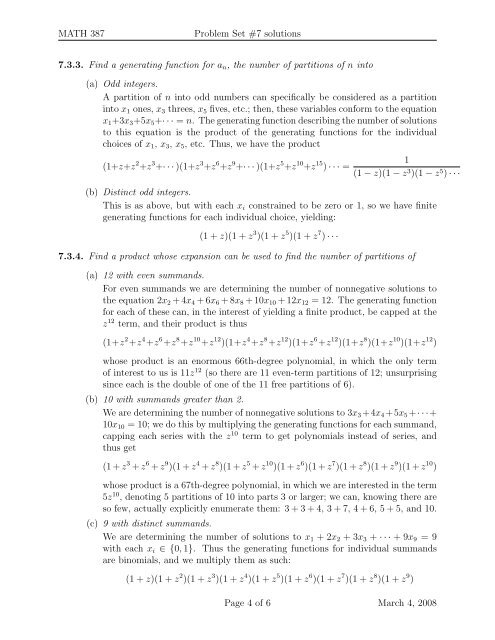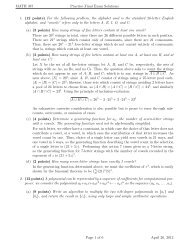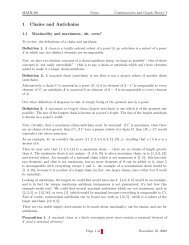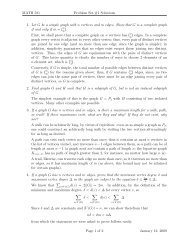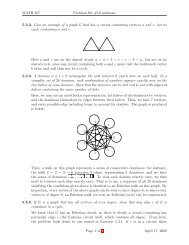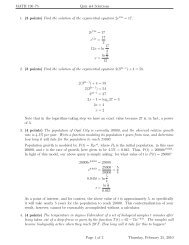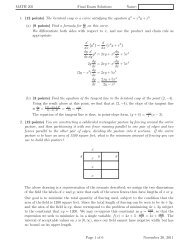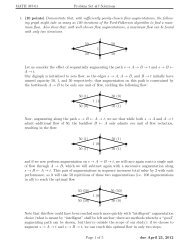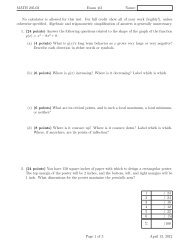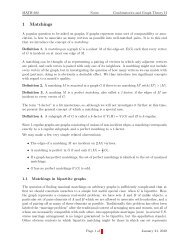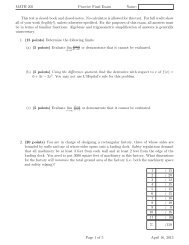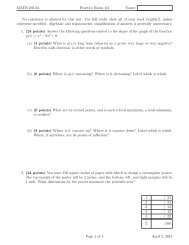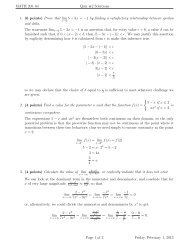MATH 387 Problem Set #7 solutions 7.2.1. (a) Find the coefficient of ...
MATH 387 Problem Set #7 solutions 7.2.1. (a) Find the coefficient of ...
MATH 387 Problem Set #7 solutions 7.2.1. (a) Find the coefficient of ...
- No tags were found...
Create successful ePaper yourself
Turn your PDF publications into a flip-book with our unique Google optimized e-Paper software.
<strong>MATH</strong> <strong>387</strong><strong>Problem</strong> <strong>Set</strong> <strong>#7</strong> <strong>solutions</strong>7.3.3. <strong>Find</strong> a generating function for a n , <strong>the</strong> number <strong>of</strong> partitions <strong>of</strong> n into(a) Odd integers.A partition <strong>of</strong> n into odd numbers can specifically be considered as a partitioninto x 1 ones, x 3 threes, x 5 fives, etc.; <strong>the</strong>n, <strong>the</strong>se variables conform to <strong>the</strong> equationx 1 +3x 3 +5x 5 +· · · = n. The generating function describing <strong>the</strong> number <strong>of</strong> <strong>solutions</strong>to this equation is <strong>the</strong> product <strong>of</strong> <strong>the</strong> generating functions for <strong>the</strong> individualchoices <strong>of</strong> x 1 , x 3 , x 5 , etc. Thus, we have <strong>the</strong> product(1+z+z 2 +z 3 +· · · )(1+z 3 +z 6 +z 9 +· · · )(1+z 5 +z 10 +z 15 ) · · · =1(1 − z)(1 − z 3 )(1 − z 5 ) · · ·(b) Distinct odd integers.This is as above, but with each x i constrained to be zero or 1, so we have finitegenerating functions for each individual choice, yielding:(1 + z)(1 + z 3 )(1 + z 5 )(1 + z 7 ) · · ·7.3.4. <strong>Find</strong> a product whose expansion can be used to find <strong>the</strong> number <strong>of</strong> partitions <strong>of</strong>(a) 12 with even summands.For even summands we are determining <strong>the</strong> number <strong>of</strong> nonnegative <strong>solutions</strong> to<strong>the</strong> equation 2x 2 + 4x 4 + 6x 6 + 8x 8 + 10x 10 + 12x 12 = 12. The generating functionfor each <strong>of</strong> <strong>the</strong>se can, in <strong>the</strong> interest <strong>of</strong> yielding a finite product, be capped at <strong>the</strong>z 12 term, and <strong>the</strong>ir product is thus(1+z 2 +z 4 +z 6 +z 8 +z 10 +z 12 )(1+z 4 +z 8 +z 12 )(1+z 6 +z 12 )(1+z 8 )(1+z 10 )(1+z 12 )whose product is an enormous 66th-degree polynomial, in which <strong>the</strong> only term<strong>of</strong> interest to us is 11z 12 (so <strong>the</strong>re are 11 even-term partitions <strong>of</strong> 12; unsurprisingsince each is <strong>the</strong> double <strong>of</strong> one <strong>of</strong> <strong>the</strong> 11 free partitions <strong>of</strong> 6).(b) 10 with summands greater than 2.We are determining <strong>the</strong> number <strong>of</strong> nonnegative <strong>solutions</strong> to 3x 3 +4x 4 +5x 5 +· · ·+10x 10 = 10; we do this by multiplying <strong>the</strong> generating functions for each summand,capping each series with <strong>the</strong> z 10 term to get polynomials instead <strong>of</strong> series, andthus get(1 + z 3 + z 6 + z 9 )(1 + z 4 + z 8 )(1 + z 5 + z 10 )(1 + z 6 )(1 + z 7 )(1 + z 8 )(1 + z 9 )(1 + z 10 )whose product is a 67th-degree polynomial, in which we are interested in <strong>the</strong> term5z 10 , denoting 5 partitions <strong>of</strong> 10 into parts 3 or larger; we can, knowing <strong>the</strong>re areso few, actually explicitly enumerate <strong>the</strong>m: 3 + 3 + 4, 3 + 7, 4 + 6, 5 + 5, and 10.(c) 9 with distinct summands.We are determining <strong>the</strong> number <strong>of</strong> <strong>solutions</strong> to x 1 + 2x 2 + 3x 3 + · · · + 9x 9 = 9with each x i ∈ {0, 1}. Thus <strong>the</strong> generating functions for individual summandsare binomials, and we multiply <strong>the</strong>m as such:(1 + z)(1 + z 2 )(1 + z 3 )(1 + z 4 )(1 + z 5 )(1 + z 6 )(1 + z 7 )(1 + z 8 )(1 + z 9 )Page 4 <strong>of</strong> 6 March 4, 2008


